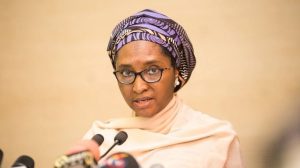
The Federal Government of Nigeria has insisted that the nation’s external debt rate can not be described as unreasonable.
Despite the accrued N31 trillion external debts, the incumbent government in a statement by the Minister of Finance, Budget and National Planning, Zainab Ahmed, said the borrowing by President Muhammadu Buhari’s administration can not be considered too high yet.
Naija News understands that the Minister stated this during a media briefing at the statehouse in Abuja on Thursday, February 25. According to Ahmed, Nigeria cannot make progress if it doesn’t borrow to fund the building of its infrastructure.
The minister disclosed that Nigeria’s problem was that of revenue, adding that there is a lot of sensitivity in Nigeria about the level of borrowing by the government and it is not misplaced.
The Minister’s statement reads: “I said earlier that the level of borrowing is not unreasonable, it is not high. The problem we have is that of revenue.
“So, what we need to do is to increase revenue to be able to enhance our debt to GDP obligation capacity. If we say we will not borrow and therefore not build rials and major infrastructure until our revenue rises enough, then, we will regress as a country. We will be left behind, we won’t be able to improve our business environment and our economy will not grow.
“So, it is a decision that every government has to take. Our assessment is that we need to borrow to build our major infrastructure. We just need to make sure that when we borrow, we are applying the borrowing to specific major infrastructure that will enhance the business environment in this country.
Giving further explanation on her claims, Ahmed said “Again, we all have to work not just the federal government but state governments to increase our revenue to enhance our debt service obligations.
“We also have to make sure that when we are choosing the projects, we are choosing carefully the ones that will enhance the business environment so that more revenue yields come into the treasuries of the country,”
Ahmed revealed that her ministry will soon secure the federal executive council meeting approval to compel federal government agencies to buy made in Nigeria vehicles as much as is practicable, adding that a supplementary budget will be sent to the National Assembly in March specifically for COVID -19 vaccination.
She added: “We already releasing money to the health authority to start operation in the first batch of vaccines that are going to arrive in the country in one week. But what we have in the budget is not enough.
“So we are working with the health authorities to provide a plan that will be taken to the President for approval and to is be taken to the National Assembly as a supplementary budget specifically for COVID -19 vaccination.
“On the Supplementary budget, she said “there will be a supplementary budget, the first one will be in March relating the COVID-19 pandemic but we will also have a mid-year review like we did last year of the budget and if at the time we do the review and there is a need to go back to do any amendment for a supplementary budget, at that time we will take that decision, if not, we will just report the review.
Speaking on Chinese loans which received a series of condemnations by many Nigerians recently, the Minister said: “If I may be permitted to speak to the question by the business. I think it’s useful to look at the budget for each year; look at the revenues, look at the expenditure, if you take out the new borrowing, really, what will the size of the budget be? How much can the government spend?
“So there will be a lot of capital projects that are affected, so we need to look at it that borrowing is, even as you see it in the budget every year, used to support infrastructural development, otherwise, there’ll be a challenge.
“Secondly, let me add, I think we’re going through a process where we need to borrow now, let’s just say in the short to medium term, to get the economy going, while we also expect revenues to improve.
“So in terms of the pressure of debt service, by the time the revenue comes up, that should be lower, but there are some things you need to do now, to ensure that revenue comes up. So we need to keep that in mind that if the economy grows and revenues improve, then debt service to revenue, in future, should be lower,” she added.
Meanwhile, the Independent Corrupt Practices Commission (ICPC) has confiscated $919,202 – equivalent to N350 million from Rivers State High Court staff.
Naija News reports that the ICPC found the money in the savings accounts of three people working for the court, including the Chief Registrar, the Deputy Registrar of the Federal High Court and the Station Road, Port-Harcourt Branch of Union Bank of Nigeria.


